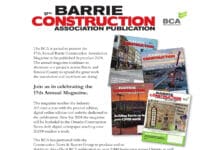Have you filed elections to reduce your WSIB costs?
By Brian Morcombe CPA, CMA with BDO Canada LLP
You’ll agree that recent changes made by Ontario’s Workplace Safety and Insurance Board (WSIB) have had a costly impact on the industry. With few exceptions, construction-based owners, sole proprietors, partners and executive officers that engage in a “construction activity” now find themselves in the crosshairs of Bill 119, and the WSIB exemptions previously available have now been eliminated. The changes have cost many construction employers tens of thousands per year and, in some cases, interest and penalties where the new rules have not been applied correctly.
However, the WSIB has also introduced relief provisions for certain individuals who do not physically engage in a construction activity. These elections are scarcely used but may reduce and/or eliminate WSIB premiums on certain partners and executive officers specifically. Given the likelihood of savings, this is something all construction employers should look into.
To bring the opportunity into focus, a little background may be helpful. Prior to 2013, officers of a company were exempted from WSIB premiums where certain conditions were met. This is no longer the case. Effective January 1, 2013, independent operators, sole proprietors, partners of a partnership and executive officers of a corporation in the construction industry (also known as Class G construction employers) are now deemed to be workers for whom insurable earnings must be reported and premiums remitted. Up to the beginning of 2014, the WSIB appeared to offer amnesty on penalties for employers who failed to report earnings as a result of Bill 119 changes but premiums were still due on the earnings.
Like all legislation, there are exclusions that complicate matters. For example, a contractor who is an individual engaged exclusively in home renovation contracts and retained directly by a homeowner may be exempted from paying the new premiums. However, if the same contractor takes on a single commercial project, the contractor is excluded from such exceptions and is subject to WSIB.
There are measures that partnerships and corporations can take to ease the financial pain of Bill 119. The first is to obtain an exemption for one of the partners of a partnership or an executive officer of a corporation (herein referred to as partner/officer) from WSIB premiums. Class G construction employers can elect to exclude one partner/officer from the premiums calculation as long as that partner/officer is not engaged in physical construction activities.
Unfortunately, all other partners/officers must be included in the premiums calculation up to the 2014 earnings cap of $84,100. Not taking into account experience ratings, this can have an impact of as much as $15,400 per officer per year. In fact, one employer recently contacted us after being assessed more than $60,000 of WSIB premiums in respect of four executive officers who were incorrectly excluded from WSIB premiums for the 2013 year alone.
This gives rise to the next opportunity to potentially reduce your WSIB costs. Where an employer has a partner/officer whose earnings are now insurable pursuant to Bill 119 and the partner/officer does not physically engage in construction activities, the employer can elect to have the partner/officer reclassified in a lower rate group, and at only $0.21/$100 of payroll. The employer’s WSIB cost could drop from $15,400 to $176 per partner/officer per year. Notice to the more creative readers: before you go making the mailroom clerk an executive officer to reduce premiums, understand that the WSIB has issued policies outlining who qualifies as an officer.
In short, if you are a Class G construction employer for WSIB purposes and you have not already elected to exclude a qualifying partner/officer from your WSIB premiums as well as elected to have the remaining qualifying partners and executive officers reclassified to the reduced rate, consult with a WSIB specialist to confirm your eligibility. The savings could be substantial.
Brian Morcombe CPA, CMA is a senior tax manager with BDO Canada LLP’s national Indirect Tax group, with more than 20 sales and payroll tax specialists located throughout Canada. E-mail bmorcombe@bdo.ca or phone (905) 946-5406.




